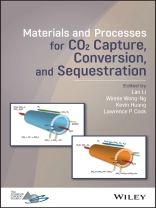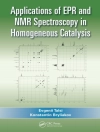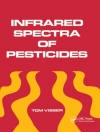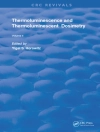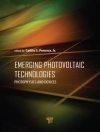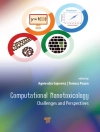Addresses materials, technology, and products that could help solve the global environmental crisis once commercialized
This multidisciplinary book encompasses state-of-the-art research on the topics of Carbon Capture and Storage (CCS), and complements existing CCS technique publications with the newest research and reviews. It discusses key challenges involved in the CCS materials design, processing, and modeling and provides in-depth coverage of solvent-based carbon capture, sorbent-based carbon capture, membrane-based carbon capture, novel carbon capture methods, computational modeling, carbon capture materials including metal organic frameworks (MOF), electrochemical capture and conversion, membranes and solvents, and geological sequestration.
Materials and Processes for CO2 Capture, Conversion and Sequestration offers chapters on: Carbon Capture in Metal-Organic Frameworks; Metal Organic Frameworks Materials for Post-Combustion CO2 Capture; New Progress of Microporous Metal-Organic Frameworks in CO2 Capture and Separation; In Situ Diffraction Studies of Selected Metal-Organic Framework (MOF) Materials for Guest Capture Applications; Electrochemical CO2 Capture and Conversion; Electrochemical Valorization of Carbon Dioxide in Molten Salts; Microstructural and Structural Characterization of Materials for CO2 Storage using Multi-Scale X-Ray Scattering Methods; Contribution of Density Functional Theory to Microporous Materials for Carbon Capture; and Computational Modeling Study of Mn O2 Octahedral Molecular Sieves for Carbon Dioxide Capture Applications.
* Addresses one of the most pressing concerns of society–that of environmental damage caused by the greenhouse gases emitted as we use fossil fuels
* Covers cutting-edge capture technology with a focus on materials and technology rather than regulation and cost
* Highlights the common and novel CCS materials that are of greatest interest to industrial researchers
* Provides insight into CCS materials design, processing characterization, and computer modeling
Materials and Processes for CO2 Capture, Conversion and Sequestration is ideal for materials scientists and engineers, energy scientists and engineers, inorganic chemists, environmental scientists, pollution control scientists, and carbon chemists.
Cuprins
Preface
List of Contributors
Chapter 1 Carbon Capture in Metal-Organic Frameworks
Chapter 2 Metal Organic Frameworks Materials for Post-Combustion CO2 Capture
Chapter 3 New Progress of Microporous Metal-Organic Frameworks in CO2 Capture and Separation
Chapter 4 In situ Diffraction Studies of Selected Metal-Organic Framework (MOF) Materials for Guest Capture/Exchange Applications
Chapter 5 Electrochemical CO2 Capture and Conversion
Chapter 6 Electrochemical Valorization of Carbon Dioxide in Molten Salts
Chapter 7 Microstructural and Structural Characterization of Materials for CO2 Storage using Multi-Scale X-Ray Scattering Methods
Chapter 8 Contribution of Density Functional Theory to Microporous Materials for Carbon Capture
Chapter 9 Computational Modeling Study of Mn O2 Octahedral Molecular Sieves for Carbon Dioxide Capture Applications
Despre autor
LAN (SAMANTHA) LI, PHD, is an assistant professor at the Micron School of Materials Science and Engineering at Boise State University, and an affiliate researcher at the Center for Advanced Energy Studies in Idaho.
WINNIE WONG-NG, PHD, FAAAS, FACA, FACERS, and DFICDD, is a research chemist in the Materials Measurement Science Division of the National Institute of Standards and Technology.
KEVIN HUANG, PHD, is a Smart State Chair professor in the Mechanical Engineering Department and director at the Smart State Center for Solid Oxide Fuel Cells at the University of South Carolina.
LAWRENCE P. COOK, PHD, is a research ordinary professor of chemistry and a lecturer in the Materials Science and Engineering Department at The Catholic University of America in Washington, DC.
